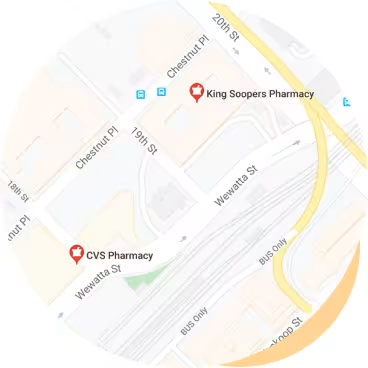- Sexual Health
- STDs
- HPV
Genital Warts
Genital warts medication and treatment available online
Genital warts are a common STI caused by certain HPV strains. Anyone sexually active can be at risk of contracting the virus through intimate skin-to-skin contact. Certain factors, such as a weakened immune system or multiple sexual partners, can increase the risk of developing genital warts. At PlushCare, we understand the delicate nature of discussing and treating STIs. Our telemedicine platform provides a convenient, confidential solution for patients seeking expert care.
Book an appointmentAccess to prescription medications for genital warts*
Ongoing sexual health support and guidance from our trusted doctors
Convenient genital warts treatment consultations from anywhere
*Prescriptions are provided at the doctor’s discretion. Learn more about our controlled substances policy and how you can save up to 80% with our prescription discount card. PlushCare doctors cannot treat all cases of genital warts. Our primary care physicians can initially evaluate your symptoms but may need to refer you to a specialist or for in-person treatment. If you are experiencing life-threatening symptoms, seek emergency medical attention immediately.

How do you get genital warts?
Genital warts are caused by specific strains of human papillomavirus (HPV), a sexually transmitted infection (STI). The virus is transmitted through intimate skin-to-skin contact, typically during sexual activity.
HPV infections, including those causing genital warts, can sometimes be asymptomatic. This means that some people may unknowingly carry and transmit the virus causing genital warts.
Practicing safe sex, using barrier methods like condoms, and getting vaccinated against HPV can help reduce the risk of genital warts and other HPV-related conditions. PlushCare online doctors offer discreet and compassionate support, ensuring patients can address their concerns professionally. These factors contribute to the spread of genital warts:
Sexual contact: Genital warts are highly contagious and commonly transmitted through vaginal, anal, or oral sex with an infected partner.
Skin-to-skin contact: The virus spreads through direct skin-to-skin contact with an area that has visible warts or, in some cases, with the skin of an infected person, even if warts are not visible.
Multiple sexual partners: Having multiple sexual partners increases the risk of exposure to HPV, including the strains that cause genital warts.
Weakened immune system: People with a weakened immune system due to conditions such as HIV or immunosuppressive medications are more susceptible to HPV infections and the development of genital warts.
Non-sexual transmission: While less common, it's possible to transmit genital warts through non-sexual means, such as sharing personal items like towels or razors with an infected person.
What causes genital warts?
Genital warts are caused by certain strains of the human papillomavirus (HPV), a group of viruses that can infect the genital and anal areas. The specific types of HPV strains that cause genital warts differ from those that are associated with cervical cancer and other cancers.
If someone is infected with HPV, the virus may actually be silent yet contagious. Even without visible warts, transmission is still possible. Regular medical check-ups, practicing safe sex, testing for HPV, and vaccination against HPV are essential strategies for preventing and managing genital warts. Here are some key points about HPV strains:HPV types 6 and 11
The majority (90%) of genital warts are caused by HPV types 6 and 11. These strains are considered low-risk and are not typically associated with cancer development.
Different strains may cause cancer
It's important to note that while HPV types 6 and 11 cause genital warts, other high-risk strains of HPV can lead to various cancers, including cervical, anal, and oral cancers. The vaccines available for HPV, such as Gardasil 9, protect against several high-risk strains, offering preventive measures against both genital warts and certain cancers.

Signs and symptoms: diagnosing genital warts
Only a qualified doctor can accurately diagnose genital warts. Early detection and management of genital warts can help prevent potential complications and the transmission of the virus to others. Here are some signs to look out for:
Incubation period: After contracting an HPV infection, it can take weeks to several months before symptoms, such as genital warts, become noticeable. Some people infected with HPV may not develop visible warts at all.
Distinct appearance: Genital warts often have a distinctive cauliflower-like appearance. The growths can be flesh-colored or gray and may appear around the genital area, anus, or upper thighs. In some cases, the growths may be internal and not immediately visible.
Internal growths: Genital warts can manifest internally, making them more challenging to detect without a thorough medical examination. A specialized doctor may use techniques like colposcopy to visualize internal warts.
Symptoms beyond visual appearance: In addition to visible growths, symptoms may include itching or bleeding from the vagina or anus.
Mainly affecting the anogenital region: Genital warts can appear in various areas, mainly affecting the anogenital region, which includes the genitals and anus. Genital warts may also occur in specific areas such as the rectal region, vulva, vagina, and penile region.
Painful symptoms: In both men and women, genital warts may cause symptoms such as itching, discomfort, and bleeding.
How to treat genital warts with prescription drugs
Genital warts, caused by certain strains of the human papillomavirus (HPV), are typically manageable, but the virus may not be completely curable. While treatment can address the visible warts, the underlying HPV infection may continue, causing recurrent infection symptoms. With PlushCare, you can schedule a convenient online doctor visit to discuss a personalized treatment plan to manage genital warts, including getting prescription medication.
Imiquimod: Imiquimod is a topical medication that stimulates the body's defense mechanisms to target and eliminate HPV-infected cells. It is typically applied three times a week before bedtime, with the cream left on overnight. The treatment cycle may last several weeks, depending on the severity of the warts.
Condylox (podofilox): Podofilox is a topical medication that prevents the growth of genital warts. It is applied to the affected areas twice a day for three days, followed by a four-day break. This cycle may be repeated, as directed by your doctor. The treatment may extend for several weeks.
Sinecatechins: Sinecatechins, derived from green tea leaves, have antioxidant properties and may modulate the immune response to combat genital warts. They are applied three times a day for up to 16 weeks or as prescribed by a doctor.
TCA treatment (trichloroacetic acid): TCA is a chemical agent applied topically to destroy wart tissue. It is applied by a doctor or nurse, who will also decide on the needed dosage and frequency based on the severity of your symptoms.

Medical procedures to manage genital warts
Our doctors can refer you to a local specialist if they determine a procedure is recommended to treat your genital warts. Procedure options can include:
Laser treatment
Laser treatment is a technique to get rid of genital warts using concentrated light energy. This precise procedure is highly effective for external warts in the genital area. Before the treatment, a local anesthetic is often applied to minimize any potential discomfort. The laser carefully vaporizes the wart tissue, ensuring minimal impact on the surrounding healthy skin. The number of sessions required depends on the extent of the infection. Post-treatment care is needed after the procedure to support recovery during the healing period.
Surgery
Surgical removal is another alternative to treat genital warts that have not responded to other treatments. This is an invasive procedure that involves physically cutting out the warts. Either local or general anesthesia is used, depending on the size, number and location of the warts. While surgery effectively eliminates genital warts, there may be scarring after the treatment.
Cryotherapy (liquid nitrogen)
Cryotherapy, also known as freezing, is a widely used and highly effective technique for the removal of genital warts. Liquid nitrogen is applied to the affected area to freeze the warts. They eventually fall off after the treatment. Cryotherapy is well-tolerated, although multiple sessions may be necessary to ensure complete removal of the warts.
Electrosurgery
Electrosurgery is another highly effective procedure that uses high-frequency electrical currents to precisely remove genital warts. A doctor or nurse uses an electrical probe to cut away the warts. Local anesthesia is used to minimize discomfort. There may be mild redness and discomfort following the procedure.
Risks of not treating genital warts
It’s vital for those suffering from genital warts and their sexual partners to get a proper diagnosis and treatment from a board-certified doctor.
Contagious spread
One of the primary risks of not seeking treatment is the risk of spreading HPV virus to sexual partners. HPV is highly contagious, and even when warts are not visible. Treatment helps reduce the risk of transmission.
Increased wart growth and discomfort
Without treatment, genital warts may grow in size and number, leading to increased discomfort, itching, and irritation in the genital area. Larger warts can be more challenging to manage and may cause physical discomfort during activities such as sexual intercourse. Getting treatment helps minimize the size and number of warts.
Risk of vertical transmission
For pregnant women with genital warts, there is a risk of vertical transmission, where the virus may be passed from the mother to the newborn during childbirth. This can lead to respiratory papillomatosis in infants, characterized by the growth of warts in the airways. Timely treatment and management of genital warts during pregnancy are essential to reduce the risk of vertical transmission.
How to prevent genital warts
If you are sexually active, there are several measures you can take to safeguard yourself against contracting or transmitting HPV, genital warts, and other sexually transmitted infections.
Practice safe sex
One of the primary methods to prevent genital warts is by practicing safe sex, which involves consistently and correctly using condoms during any sexual activity. Condoms act as a barrier, reducing the risk of skin-to-skin contact and transmission of the human papillomavirus (HPV), the underlying cause of genital warts. However, it's important to note that condoms may not cover all potentially infected areas, so the risk is not eliminated.
Vaccination
Vaccination is a highly effective preventive measure against certain strains of HPV. The HPV vaccine is recommended for both males and females, ideally, before the onset of sexual activity. It provides protection against HPV types 6 and 11, which are responsible for the majority of genital wart cases, as well as several other high-risk HPV types linked to cervical and other cancers. Talk to one of our doctors to learn more about the HPV vaccine.
Regular check-ups and screenings
Genital warts can be transmitted even when no visible warts are present. The virus may be active in the skin or mucous membranes, leading to what is known as asymptomatic or symptomless transmission. Maintaining open communication with sexual partners and being aware of the potential risks are essential.
Always do regular medical check-ups and screenings for early detection and management. Routine gynecological or urological examinations can help identify any signs of genital warts or HPV-related changes, allowing for timely intervention. These screenings are especially important for those who are at higher risk, including those with multiple sexual partners or a history of STIs.Protecting your partner
Open communication is key to protecting a partner from getting HPV or genital warts. If one partner has been diagnosed with genital warts, it is advisable to abstain from sexual activity until treatment is completed and the warts have resolved. Using condoms consistently can also reduce the risk of transmission. Moreover, encouraging your partner to receive the HPV vaccine, if they have not already, can significantly contribute to prevention efforts.
Genital warts treatment FAQs
Do genital warts itch?
Yes, genital warts can cause itching. Itching is a common symptom associated with the presence of genital warts. Getting evaluated by a doctor will help determine the cause of the itching.
Are genital warts painful?
Genital warts may not always be painful, but they can cause discomfort, especially during activities such as sexual intercourse. Pain levels can vary; seeing a doctor or nurse is necessary for an accurate diagnosis and appropriate care.
Are genital warts cancerous?
Genital warts themselves are not cancerous. However, they are caused by certain strains of the human papillomavirus (HPV); some strains of HPV are associated with an increased risk of developing cervical and other cancers.
Will my genital warts come back?
Recurrence of genital warts is possible, especially if the underlying HPV infection persists. Regular follow-ups and sticking to your doctor’s recommended treatments are essential to help manage potential recurrences.
What’s the difference between genital warts and herpes?
Genital warts and herpes are distinct sexually transmitted infections caused by different viruses. Certain strains of HPV primarily cause genital warts, while the herpes simplex virus causes herpes. Both conditions present with unique symptoms; it’s important to see your doctor to get an accurate diagnosis if you have any STD symptoms.
Related conditions to genital warts
Comprehensive awareness and testing, if available, for a spectrum of sexually transmitted infections, including genital warts, are essential for a thorough understanding of your health and well-being.
Human papillomavirus (HPV): Genital warts are caused by specific strains of HPV, a prevalent sexually transmitted infection. Understanding HPV is crucial for managing and preventing genital warts.
Genital herpes: Genital herpes, caused by the herpes simplex virus (HSV), can present with sores or blisters in the genital area. While distinct from genital warts, both conditions are sexually transmitted and appear with similar physical symptoms, emphasizing the need for comprehensive sexual health care.
Urethritis: Urethritis, inflammation of the urethra, can be caused by infections, including STIs like HPV. Recognizing the connection between urethritis and STIs is vital for accurate diagnosis and appropriate treatment.
Chlamydia: Chlamydia is a common bacterial infection transmitted through sexual contact. While distinct from genital warts, co-infections are possible. Regular STI screenings are crucial for comprehensive sexual health.
Gonorrhea: Gonorrhea, caused by the bacterium Neisseria gonorrhoeae, is another prevalent sexually transmitted infection.
HIV and AIDS: HIV is a viral infection that compromises the immune system. While not directly related to genital warts, individuals with weakened immune systems may face challenges managing infections, including those causing genital warts.
Trichomoniasis: Trichomoniasis is a parasitic infection that can affect the genital and urinary tracts. Awareness of various STIs, including their distinct characteristics, is vital for informed sexual health decisions.
How to get genital warts treatment online

Step 1
Book an appointment to discuss genital warts treatment.
Book a same-day appointment from anywhere.

Step 2
Talk to your doctor online about your genital warts symptoms.
Visit with a doctor on your smartphone or computer.

Step 3
Pick up genital warts medication, if prescribed.
Prescriptions are provided at the doctor’s discretion. We can send prescriptions to any local pharmacy.
Genital warts treatment and medication pricing details
To get the genital warts treatment and medicationl, join our monthly membership.
Paying with insurance
Membership
$16.99/month
First month free
Visits
Copay
30 days of free membership
Same-day appointments 7 days a week
Unlimited messages with your Care Team
Prescription discount card to save up to 80%
Exclusive discounts on lab tests
Free memberships for your family
Cancel anytime
Visit price with insurance
Often the same as an office visit. Most patients with in-network insurance pay $30 or less!
We accept these insurance plans and many more:
Paying without insurance
Membership
$16.99/month
First month free
Visits
$129
30 days of free membership
Same-day appointments 7 days a week
Unlimited messages with your Care Team
Prescription discount card to save up to 80%
Exclusive discounts on lab tests
Free memberships for your family
Cancel anytime
Visit price without insurance
Initial visits are $129.
If we're unable to treat you, we'll provide a full refund.
Frequent sexual health searches
Genital warts treatment and medication resources
Sources:
PlushCare is dedicated to providing you with accurate and trustworthy health information.
AAFP. "Management of Genital Warts" Accessed on December 17, 2023 at https://www.aafp.org/pubs/afp/issues/2004/1215/p2335.html
Centers for Disease Control and Prevention. "Anogenital Warts" Accessed on December 17, 2023 at https://www.cdc.gov/std/treatment-guidelines/anogenital-warts.htm
Mount Sinai. "Genital warts" Accessed on December 17, 2023 at https://www.mountsinai.org/health-library/diseases-conditions/genital-warts
National Center for Biotechnology Information. “Genital Warts” Accessed on December 17, 2023 at https://www.ncbi.nlm.nih.gov/books/NBK441884/
National Center for Biotechnology Information. “Molluscum Contagiosum” Accessed on December 17, 2023 at https://www.ncbi.nlm.nih.gov/books/NBK441884/
American Pregnancy Association. “Genital Warts During Pregnancy” Accessed on December 17, 2023 at https://americanpregnancy.org/healthy-pregnancy/pregnancy-concerns/genital-warts-during-pregnancy/
Centers for Disease Control and Prevention. “Sexually Transmitted Diseases Treatment Guidelines, 2015” Accessed on December 17, 2023 at https://www.cdc.gov/mmwr/preview/mmwrhtml/rr6403a1.htm
UC Davis Student Health and Counseling Services. “Genital Warts (HPV)” Accessed on December 17, 2023 at https://shcs.ucdavis.edu/health-topic/genital-warts-hpv
JAMA Network. “Genital Warts” Accessed on December 17, 2023 at https://jamanetwork.com/journals/jama/fullarticle/2724027
PlushCare content is reviewed by MDs, PhDs, NPs, nutritionists, and other healthcare professionals. Learn more about our editorial standards and meet the medical team. The PlushCare site or any linked materials are not intended and should not be construed as medical advice, nor is the information a substitute for professional medical expertise or treatment.